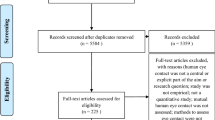Abstract
The aim of this study was to assess comparative behavior domain in patients with cochlear implants, using caretaker assessment. A prospective cross-sectional study was conducted. Of 106 patients with hearing loss and receiving cochlear implants were included along with their caretakers. The caretaker’ perspective questionnaire-22 was implemented covering emotions, education, and social relationships domain. A repeated measure ANOVA was used to statistical analysis. The implantation elicited a slight reduction in emotions scores domain as well as slight increase in social relationships scores from pre-cochlear implants to 12 months in all aged (6–10 years: − 10.7, 95%CI − 8.4 to 12.9; 4.2, 95%CI 3.0–5.5, 11–20 years: − 8.6, 95%CI − 6.7 to 10.5; 2.5, 95%CI 1.6–3.3, 21–59 years: − 6.8, 95%CI − 4.9 to 8.6; 2.0, 95%CI 1.3–2.7, and older 60 years: − 12.1, 95%CI − 9.5 to 14.6; 3.6, 95%CI 2.7–4.5, respectively). However, the education scores domain has slight increase only in aged 21–59 years group (1.8, 95%CI 0.7–2.8). A long-term after cochlear implants (12 months), but not after only 6 months elicits a statistically significant increase the social relationships scores and the reduction in negative emotions scores in all aged at implantation. However, the education scores have slight increase only in aged 21–59.
Similar content being viewed by others
References
Carlson ML, Driscoll CL, Gifford RH, McMenomey SO (2012) Cochlear implantation: current and future device options. Otolaryngol Clin North Am 45(1):221–248
Cosetti MK, Waltzman SB (2011) Cochlear implants: current status and future potential. Expert Rev Med Devices 8(3):389–401
Marangos N, Laszig R (1998) Cochlear implants. Prosthetic management of deafness at the turn of the century. HNO 46(1):12–26
Holt RF, Kirk KI, Hay-McCutcheon M (2011) Assessing multimodal spoken word-in-sentence recognition in children with normal hearing and children with cochlear implants. J Speech Lang Hear Res 54(2):632–657. https://doi.org/10.1044/1092-4388(2010/09-0148)
Holden LK, Finley CC, Firszt JB, Holden TA, Brenner C, Potts LG, Gotter BD, Vanderhoof SS, Mispagel K, Heydebrand G, Skinner MW (2013) Factors affecting open-set word recognition in adults with cochlear implants. Ear Hear 34(3):342–360. https://doi.org/10.1097/AUD.0b013e3182741aa7
Yorgun M, Surmelioglu O, Tuncer U, Tarkan O, Ozdemir S, Cekic E, Cetik F, Kiroglu M (2015) Quality of life in pediatric cochlear implantations. J Int Adv Otol 11(3):218–221
Colletti L, Shannon RV, Colletti V (2014) The development of auditory perception in children after auditory brainstem implantation. Audiol Neurotol 19(6):386–394. https://doi.org/10.1159/000363684
Hashemi SB, Monshizadeh L (2016) Comparison of auditory perception in cochlear implanted children with and without additional disabilities. Iran J Med Sci 41(3):186–190
Fortunato-Tavares T, Befi-Lopes D, Bento RF, Andrade CR (2012) Children with cochlear implants: communication skills and quality of life. Braz J Otorhinolaryngol 78(1):15–25
Volleth N, Hast A, Lehmann EK, Hoppe U (2018) Subjective improvement of hearing through cochlear implantation. HNO 22(10):018–0529
Contrera KJ, Betz J, Li L, Blake CR, Sung YK, Choi JS, Lin FR (2016) Quality of life after intervention with a cochlear implant or hearing aid. Laryngoscope 126(9):2110–2115
Brüggemann P, Szczepek AJ, Klee K, Gräbel S, Mazurek B, Olze H (2017) In patients undergoing cochlear implantation, psychological burden affects tinnitus and the overall outcome of auditory rehabilitation. Front Hum Neurosci 11:226. https://doi.org/10.3389/fnhum.2017.00226
Olze H, Knopke S, Grabel S, Szczepek AJ (2016) Rapid positive influence of cochlear implantation on the quality of life in adults 70 years and older. Audiol Neurootol 1:43–47
Looi V, Lee ZZ, Loo JH (2016) Hearing-related quality of life outcomes for Singaporean children using hearing aids or cochlear implants. Eur Ann Otorhinolaryngol Head Neck Dis 133(1):3
StataCorp (2013) Stata statistical software. Release 13 edn. StataCorp LP, College Station
Wiefferink CH, Rieffe C, Ketelaar L, De Raeve L, Frijns JH (2013) Emotion understanding in deaf children with a cochlear implant. J Deaf Stud Deaf Educ 18(2):175–186
Punch R, Hyde M (2011) Social participation of children and adolescents with cochlear implants: a qualitative analysis of parent, teacher, and child interviews. J Deaf Stud Deaf Educ 16(4):474–493
Mikic B, Miric D, Nikolic-Mikic M, Ostojic S, Asanovic M (2014) Age at implantation and auditory memory in cochlear implanted children. Cochlear Implants Int 15(1):000000000191
Bruijnzeel H, Ziylan F, Stegeman I, Topsakal V, Grolman W (2016) A systematic review to define the speech and language benefit of early (< 12 months) pediatric cochlear implantation. Audiol Neurootol 21(2):113–126
Bollard PM, Chute PM, Popp A, Parisier SC (1999) Specific language growth in young children using the CLARION cochlear implant. Ann Otol Rhinol Laryngol Suppl 177:119–123
Razafimahefa-Raoelina T, Farinetti A, Nicollas R, Triglia JM, Roman S, Anderson L (2016) Self- and parental assessment of quality of life in child cochlear implant bearers. Eur Ann Otorhinolaryngol Head Neck Dis 133(1):31–35
Acknowledgements
The authors are grateful to all the patients and families who kindly participated in this study. The strategic wisdom and research institute, and the research faculty of medicine, Srinakharinwirot University for their kindness supporting, time and assistance during the study. The authors wish to thank the MSMC in approval a grant to J.S.
Funding
This study has received financial support from the MSMC (Grant Number 606/2015).
Author information
Authors and Affiliations
Contributions
JS wrote the proposal to apply a grant, designed the study, screened and examined all the recruited subjects, researched data, and reviewed the manuscript. KK Analyzed data and performed the statistical analysis and wrote the manuscript. Both of JS and KK are the guarantor of this work and, as such, had full access to all the data in the study and take responsibility for the integrity of the data and the accuracy of the data analysis.
Corresponding author
Ethics declarations
Conflict of interest
The authors declare that they have no conflict of interest.
Additional information
Publisher's Note
Springer Nature remains neutral with regard to jurisdictional claims in published maps and institutional affiliations.
Electronic supplementary material
Below is the link to the electronic supplementary material.
Rights and permissions
About this article
Cite this article
Sirirattawan, J., Khuancharee, K. Measures of Comparative Behavior in Hearing Loss Patients with Cochlear Implant: Caretaker Assessment. Indian J Otolaryngol Head Neck Surg 71 (Suppl 2), 1147–1152 (2019). https://doi.org/10.1007/s12070-018-01574-x
Received:
Accepted:
Published:
Issue Date:
DOI: https://doi.org/10.1007/s12070-018-01574-x




